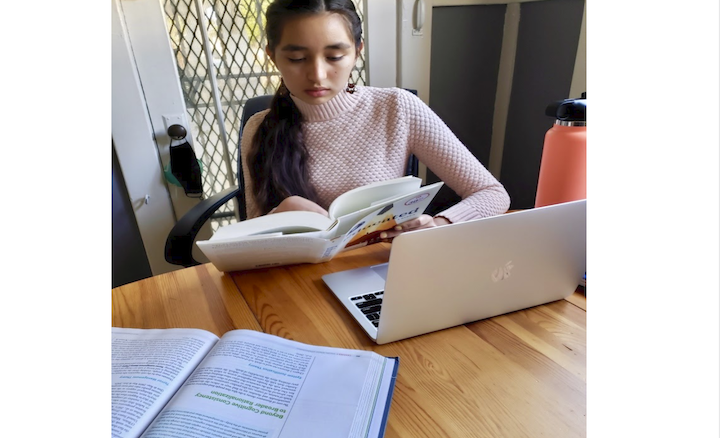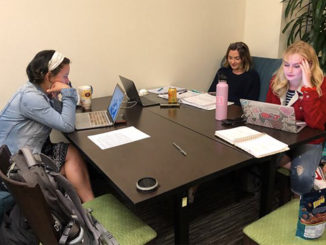
Cheating can be tempting for any student and possibly even more so in an online format.
During the 2020-2021 academic year, Pepperdine professors were faced with the decision of how they would choose to test their students in a remote setting where monitoring them became difficult and intrusive. The main concern amongst faculty became how to rethink exams to ensure that students were still learning despite the possibility of cheating.
“The Center for Teaching Excellence is more thinking about getting out in front of it and trying to think proactively about better ways of assessing students that encourage learning, that don’t require additional software, that don’t make students feel anxious and agitated and nervous,” said Paul Begin, the associate dean of curriculum at Pepperdine and a Hispanic studies professor.
With academic integrity being difficult to maintain across all universities, Pepperdine professors focused on what matters: that students were learning and gaining something from their classes. Students said they have felt the impact of these incentives and have experienced a variety of different testing formats and methods in their classes.
Cheating uprises in the U.S.
Universities in the United States have struggled with a rise in student cheating violations during online instruction due to the pandemic.
Penn State University noticed a huge increase in cheating when it switched to an online format in spring 2020 and “reported a 72% increase in cheating case investigations from the 2018-2019 to 2019-2020 academic year,” Lindsey Perlman wrote in an October 2020 Daily Pennsylvanian article.
Begin said Pepperdine actually experienced a sharp decrease in academic integrity violations since the pandemic started.
Pepperdine students themselves agreed that cheating is a very real possibility during the pandemic.
“It’s definitely a lot easier to cheat now, and teachers know it,” freshman psychology major Eva Duran said.
Professors said cheating is easier to get away with in a virtual setting with the possibilities of having notes open or help from a friend.
“There is a perception, and a reality, that it is easier in a sense to cheat on an online test, ” said Chris Heard, the director for the Center for Teaching Excellence and a religion professor.
Pepperdine’s Proctortrack rejection
As a result, many institutions, including Pepperdine, have tried to monitor online testing through the use of proctoring and lockdown browser services.
“There is a tendency to want to try to deploy technology in a way that could semi-replicate what happens in class,” Heard said.
Proctortrack, an online testing proctoring service that monitors students, served as a seemingly simple solution to this issue.
“It basically uses your webcam to record the student while you’re taking a test,” Heard said. “Then it uses an A.I. program to scan the video, and it’s got certain algorithms that it’s looking for, certain kinds of motions that it’s looking for, and any of those motions that are recorded will get a flag.”
Students have protested against the use of proctoring services and cheating software because they think it is unfair and invasive, Drew Harwell wrote in a November 2020 Washington Post article.
Even with these concerns, some professors still think technology is the solution to more easily adjust their classes to online learning.
“I think the big thing that has changed is that professors who rely on high stakes exams, or even frequent, low-stakes in-class quizzes, have felt a loss of control over the testing environment,” Heard said.
However, since its initial implementation in summer 2020, much of Pepperdine’s faculty stepped away from the use of Proctortrack within classrooms.
“We kind of created tutorials on how to assess student learning without using a lockdown browser,” Begin said.
Some professors still utilize such lockdown browser systems or rely on live Zoom sessions to monitor their students. Keri Peek, junior piano performance and accounting major, said she is recorded during her accounting class tests while her one of her other classes uses Qualtrics, a system that monitors a student’s IP address during testing.
As a professor who never utilized Proctortrack, Heard said he thinks proctoring services are more trouble than they are worth.
“They are less effective in my view than changing the type of assessment,” Heard said. “I feel like they also breed an atmosphere of distrust in a way that has negative consequences.”
Freshman sustainability major Noelle Alderton has had no experiences with Proctortrack within her classes.
“I’ve never had a professor monitor us while taking a test,” Alderton said. “And all my professors have made it clear that’s not something that they want to do.”
The real goal
Since cheating cannot be easily avoided online and the possibility of cheating for students will always exist, Pepperdine professors had to shift their focus.
“Faculty members always aspire to eliminate academic dishonesty completely,” Heard said. “What we want is 100% academic integrity, 0% cheating. But we will never get there because we are all human beings.”
Thus, professors made it their goal to try to implement methods to ensure learning retention instead of finding strict ways to maintain academic integrity. Heard said he thinks that the solution lies in removing the motivation to cheat and making it a less attractive option for students.
Some professors have even gone so far as to stray away from testing altogether.
“This semester I noticed that I don’t have a lot of tests,” Alderton said.
In his religion classes, Heard is an advocate for moving away from exams.
“My classes don’t have exams in that traditional sense anymore,” Heard said. “I’ve abandoned those pretty much completely.”
Instead, Heard said he promotes more frequent quizzes, reducing the stakes of a single assessment, and assigns more analytical and personal assignments that reflect the type of work done in an actual professional setting.
“I wouldn’t expect to eliminate cheating completely by doing these things,” Heard said. “They do lower the motivation to cheat, and they also build an atmosphere where the focus can be on learning in a trustful environment.”
Such methods acknowledge the ability to utilize outside resources while also making the student put in the work to find an answer and understand what they are learning, Begin said.
Professors’ changes to class lessons and assessments to adapt to the new circumstances take a lot of time and effort.
“I would say faculty are spending at least double the amount of time it takes to prep and teach and grade online than it would for a regular class,” Begin said. “They are working hard.”
Impact on students
Students noticed the professors’ efforts, and there was an overall positive effect on students’ learning during online instruction.
Alderton said she has had a lot of open-note tests with more thought-provoking questions. Along with that, she had more analytical essays and project assessments rather than tests.
“I truly believe that my professors are focusing less on how well you can regurgitate material and actually trying to identify our voices,” Alderton said.
Pepperdine faculty managed to still make their students feel challenged academically during a year of uncertainty of being in a new learning environment.
“For the most part, my classes have made it where cheating would not help you even if you tried,” Alderton said.
Timothy Jackson, freshman computer science major, said even on open-note exams, time is so limited during them that it would be difficult to try to cheat.
Duran said she misses the standard testing format offered through in-person classes since exams are more familiar to her and would prefer them over the supplementary assessments that professors implemented in response to online classes.
Despite all the rigorous work and assessments, professors are also largely sympathetic to students who struggled with adjusting to online classes. Jackson said professors recognize the stressful online environment and try to pace out the workload well.
In general, students said professors made their classes worth it for their students who just want an education.
“All in all, I would just say that I am appreciative of how my teachers are thinking about academic integrity and also how they are structuring their classes so we can try to succeed from that,” Alderton said.
Jackie Lopez completed the reporting for this story under the supervision of Dr. Christina Littlefield and Dr. Theresa de los Santos in Jour 241 in Spring 2021. Dr. Littlefield supervised the web story.



